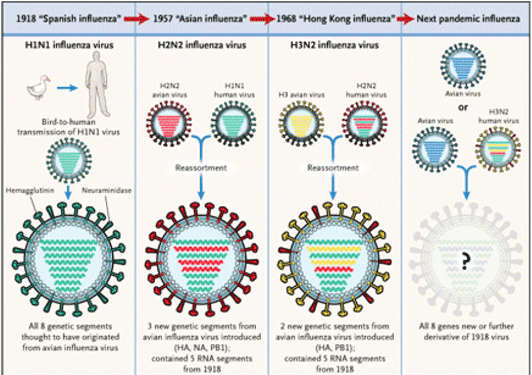However additional analysis should be performed to confirm the origin of the virus. This virus was originally referred to as swine flu because laboratory testing showed that its gene segments were similar to influenza viruses that were most recently identified in and known to circulate among pigs.
Die Übertragung des Virus erfolgt üblicherweise durch direkten Kontakt mit oder unmittelbare Nähe zu infizierten Menschen oder Tieren.

Source of h1n1 virus. Influenza-A-Virus H1N1 Eine Variante von AH1N1 konnte als Auslöser der so genannten Spanischen Grippe von 19181920 im Lungengewebe von Opfern nachgewiesen werden. 2005 gelang Jeffery Taubenberger eine Rekonstruktion des Erregers der Spanischen Grippe aus Genfragmenten. That changed several years ago when a new virus emerged that.
This ancestor virus diverged about 19131915 into two clades or biological groups which gave rise to the classical swine and human H1N1 influenza lineages. Where did the 2009 H1N1 flu virus come from. Soldiers in World War I.
Instead it spread through airborne droplets from human to human and potentially through human contact with inanimate objects. Previously the most closely related ancestor viruses to the 2009 H1N1 virus were identified in Asian swine but they were not as close genetically to the human 2009 pandemic H1N1 virus as the. Their genetic material consists of eight separate strands of RNA.
Its called swine flu because in the past the people who caught it had direct contact with pigs. Six of the genes are closest in sequence to those of H1N2 triple-reassortant influenza viruses isolated from pigs in North America around 1999-2000. YouTube as a source of information on the H1N1 influenza pandemic.
However the 2009 H1N1 virus was not zoonotic swine flu because it was not transferred from pigs to humans. The 2009 H1N1 influenza virus referred to as swine flu early on was first detected in people in the United States in April 2009. The 2009 H1N1 pandemic was caused by an influenza virus.
Because pigs are more readily infected with avian influenza viruses than are humans they were suggested as the original recipients of the virus passing. The swine-origin influenza A H1N1 virus that appeared in 2009 and was first found in human beings in Mexico is a reassortant with at least three parents. H1N1 flu is also known as swine flu.
The Spanish flu the first known pandemic to involve the H1N1 virus came in several waves and killed its victims quickly often within a matter of hours or days. A source-based preference is seen among the viewers and CDC-uploaded videos are being used in an increasing proportion as a source of authentic information about the disease. YouTube has a substantial amount of useful information about H1N1 influenza.
Virus isolation and typing using haemagglutination inhibition or immunofluorescence Current protocols for virus isolation of seasonal influenza viruses using MDCK cells and egg. In 2009 a new strain H1N1 swine flu spread fast around the world among humans and the World Health Organization WHO labeled it a pandemic. Das Virus das für den aktuellen Ausbruch der Grippe beim Menschen verantwortlich ist ist ein neuer Stamm des H1N1-Influenzavirus.
The last common ancestor of human strains dates to between February 1917 and April 1918. Ein erneuter weltweiter Ausbruch die so genannte Russische Grippe ereignete sich 1977. Influenza viruses are part of the viral family Orthomyxoviridae.


